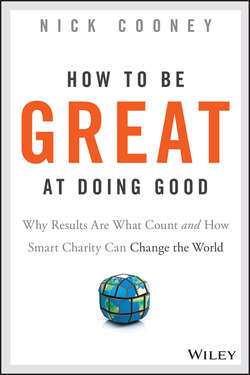Читать книгу How To Be Great At Doing Good - Cooney Nick - Страница 5
На сайте Литреса книга снята с продажи.
1
Why Charity?
Asking Why
ОглавлениеWhen I was eight, my brother, sister, and I had a little game we liked to play. The goal of this game was simple: to drive my mom crazy.
We had each received as a Christmas present a white magnetic board with a set of brown tiles. By arranging the tiles on the board you could write words or draw blocky, pixelated pictures. By today's standards this sounds like a pretty boring toy, but for us it was a lot of fun. On my brother's whiteboard he would use the tiles to spell out the letter “W.” On mine I spelled out the letter “H.” My sister spelled out “Y.” Then we'd ask my mom a question – something innocent enough, like “What's for dinner?” After she'd reply, we'd each hold up our letters and chant, “Why?” The exchange went a little something like this:
“What's for dinner?”
“Pasta and green beans.”
“Why?”
“Because that's what I'm making.”
“Why?”
“Because that's what I bought at the store.”
“Why?”
“Because that's what was on sale.”
“Why?”
“Because that's what the manager made on sale.”
“Why?”
“I don't know – now get out of my kitchen!”
“Why?”
“Because I said so!”
“Why?”
I think you get the point.
Obviously, we were just asking “why, why, why” to be annoying; there's always great fun in aggravating your parents. As adults though, the habit of continually asking ourselves “Why?” is one of the most important habits we can cultivate. As we dig deeper and deeper into things – into ourselves, into our beliefs, into how society operates – we come to greater understanding and a greater ability to live a more intentional life.
What do I want to accomplish before I die? How do I feel about marriage equality? Why do many people who are born into poverty remain in poverty as adults? For every such question there are both surface-level answers and deeper, more penetrating answers. Those latter answers can only be reached by repeatedly asking: “Why?”
Consider, for example, the following question-and-answer session you might have with yourself about poverty:
• “Why do many people remain poor into adulthood?”
• “Because they don't get high-paying jobs.”
• “Why is that?”
• “Because they don't stay in school or go to college so they don't have the qualifications.”
• “Why don't they stay in school or go to college?”
• “Well, one reason is they get bad grades so they become frustrated with it and drop out.”
• “Why do they get bad grades?”
• “One reason is lack of parental involvement.”
• “Why aren't parents as involved as they could be?”
Deeper and deeper we go. While there is rarely one single answer at the bottom, each time we ask “Why?” we move a little closer to understanding what's really going on.
All of us are used to at least occasionally asking: “Why?” Every one of us has had the experience of shifting our opinion on something after we learned or thought more about it. We want to understand the world around us, and we want to have good reasons for doing the things we do. That's the reason we ask others and ourselves that so very important question: “Why?”
